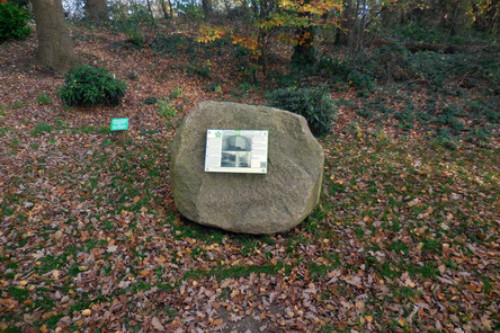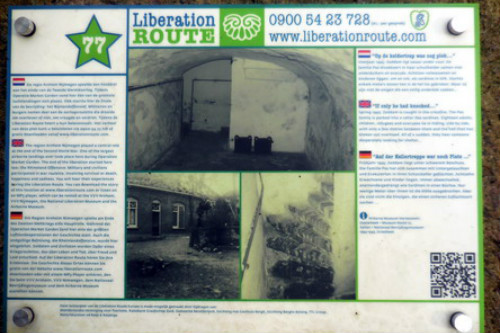Liberation Route Marker 077: If only he had knocked
If only he had knocked
In March and April 1945, the fighting had reached the Achterhoek region. Those who were there to witness the events can still remember vividly, what it was like to hide in the cellars whilst the war raged overhead. The noise, the fear, the smell; the low lighting from the carbide lamps; the lack of space and the prayers. These traumatic experiences have left a lasting mark on each and every one of them.
In September 1944, Operation Market Garden failed to achieve its goal, and the allied advance came to a standstill in the area around Arnhem and Nijmegen. For months, the area was terrorised by heavy bombing, floods and artillery fire. Large-scale evacuation was the result, and many people are killed on both sides, including a great number of civilians. The frontline however, did not move.
The allies faced a difficult task: moving north from Nijmegen into the Betuwe region, which had been flooded by the oppucying forces, and in the east, the Siegfried Line. This was one of the most important lines of defense built by the German Reich and it was blocking their advance.
The allies had to find a way of breaking through. In February 1945, the Rhineland Offensive was launched from the area around Nijmegen. After heavy fighting, the allies succeeded in conquering the area in Germany to the west of the Rhine. At the end of March, they managed to cross the Rhine and continue their advance. Part of the army made its way back across the Dutch border into the Achterhoek region to liberate this eastern-most corner of the Netherlands.
The Easter Sunday of 1945 fell on the 1st April. On this day, the fighting around the town of Zeddam had reached its peak. The civilians that had stayed behind in the local farms, hid in bombshelters and cellars with their families, shoulder to shoulder with refugees and other people in hiding. There was little room to move.
Audiospot - If only he had knocked
Liberation Route Europe is a certified Cultural Route of the Council of Europe. With hundreds of sites and stories in nine European countries, the route links the main regions along the advance of the Allied Forces in 1943-1945.
The entire route consists of themed routes that can be travelled by by hiking, walking, cycling and car. These routes pass numerous historical and interesting sites and tell stories from a multitude of perspectives that were important in the final phase of World War II.
Many routes feature listening spots, offering the opportunity to listen to a historical story at a location. In addition, many ‘Vectors of Memory’ have been placed, indicating that the passer-by is on one of the Liberation Routes.
The routes can be found on the Liberation Route Europe website or in the app through which many stories can also be listened to.
Do you have more information about this location? Inform us!
Source
- Text: TracesOfWar & Liberation Route Europe
- Photos: Henny van Loenen
Nearby
Museum
Point of interest
- Ordnance QF 25 Pounder Cannon - 's-Heerenberg
- Stained Glass Window Pancratiuskerk - 's-Heerenberg
- M4A4 Sherman Tank Doetinchem - Doetinchem
Monument
- War Memorial Zeddam - Zeddam
- War Memorial 's-Heerenberg - 's-Heerenberg
- Memorial Kasteel Huis Bergh - 's-Heerenberg
Cemetery
- Dutch War Graves Roman Catholic Cemetery Zeddam - Zeddam
- Commonwealth War Graves Protestant Cemetery Zeddam - Zeddam
- Commonwealth War Graves Roman Catholic Churchyard Kilder - Kilder
Remembrance Stone
- Stumbling Stone Benedendorpsstraat 21 - Zeddam
- Stumbling Stone Vinkwijkseweg 21 (former Vinkwijk 58) - Zeddam
- Stumbling Stones Klinkerstraat 46 - 's-Heerenberg
Fortification
- Kochbunker 'Mengelenberg' Montferland - Zeddam
- Kochbunker 'Kale Jacob 3' Montferland - Zeddam
- Kochbunker 'Kale Jacob 2' Montferland - Zeddam






